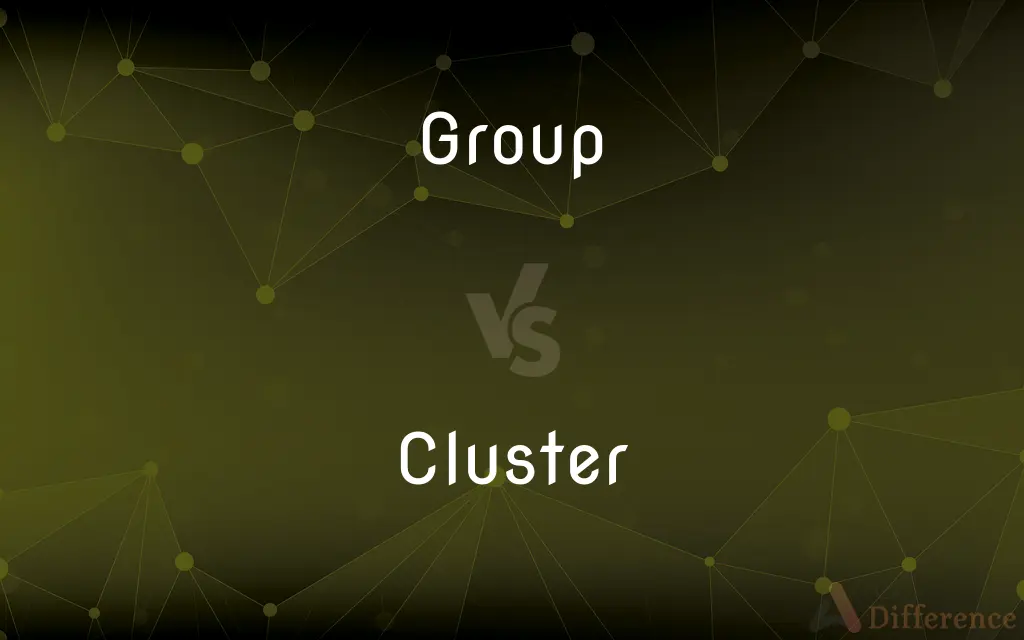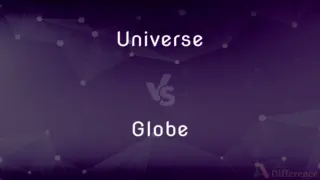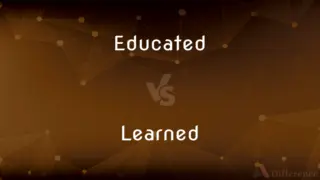Group vs. Cluster — What's the Difference?
By Tayyaba Rehman & Urooj Arif — Updated on April 15, 2024
Groups are collections of individuals or items organized with a common purpose, whereas clusters are often naturally formed aggregations based on similarities.

Difference Between Group and Cluster
Table of Contents
ADVERTISEMENT
Key Differences
A group typically refers to a collection of people or objects that are purposefully brought together for a specific reason, such as a work project or a social gathering. On the other hand, a cluster usually refers to an assembly that forms more organically, often because of inherent similarities or close proximities within a particular context.
In social sciences, a group is often defined by its clear structure, roles, and objectives which guide the behavior of its members. Conversely, a cluster, such as those seen in statistical data or geographic distributions, forms based on similar characteristics or natural alignments without a predetermined structure.
Groups are generally characterized by interaction among its members, who work towards shared goals and are aware of their collective identity. Clusters, however, may not involve active interaction; instead, they are categorized together through external observations or through data analysis techniques.
The formation of a group is usually intentional and involves planning, such as forming a project team in an office or organizing a study group. In contrast, clusters might be identified by algorithms in data mining or emerge spontaneously in social settings, like people clustering in different areas at a party based on common interests.
In terms of purpose, groups are formed to achieve specific objectives, which could be completing a task, providing support, or making decisions collectively. Clusters, while they may influence behavior or decision-making, primarily exist as a result of patterns or trends observed within data or behavior, without a collective goal.
ADVERTISEMENT
Comparison Chart
Definition
A collection with a purpose
A naturally formed aggregation
Formation
Intentional and organized
Organic or identified by patterns
Interaction
Active among members
Passive or not required
Example Contexts
Work teams, social clubs
Data sets, geographical areas
Purpose
To achieve specific goals
To denote similarity or proximity
Compare with Definitions
Group
Members are usually aware of their inclusion in the group.
All group members received an agenda before the meeting.
Cluster
An aggregation based on similarity or proximity.
The cluster of ancient artifacts was discovered in a compact area.
Group
A set of individuals assembled for a common purpose.
The project group met weekly to update on their progress.
Cluster
Identified through analysis or naturally occurring.
The data cluster revealed a surprising trend in consumer behavior.
Group
Characterized by structured interaction and roles.
Each member of the research group had a specific role to fulfill.
Cluster
Does not necessarily involve deliberate organization.
Fans clustered around the stage as the concert began.
Group
Often created to achieve collective objectives.
The therapy group was formed to provide support and share experiences.
Cluster
Common in statistical analysis and geography.
The study identified several demographic clusters across the city.
Group
Can be formal or informal in nature.
The book club was a casual group of literature enthusiasts.
Cluster
Lacks a specific collective goal.
The cluster of trees naturally protected the area from wind.
Group
An assemblage of persons or objects gathered or located together; an aggregation
A group of dinner guests.
A group of buildings near the road.
Cluster
A group of the same or similar elements gathered or occurring closely together; a bunch
"She held out her hand, a small tight cluster of fingers" (Anne Tyler).
Group
A set of two or more figures that make up a unit or design, as in sculpture.
Cluster
(Linguistics) Two or more successive consonants in a word, as cl and st in the word cluster.
Group
A number of individuals or things considered or classed together because of similarities
A small group of supporters across the country.
Cluster
A group of academic courses in a related area.
Group
(Linguistics) A category of related languages that is less inclusive than a family.
Cluster
To gather or grow into bunches.
Group
A military unit consisting of two or more battalions and a headquarters.
Cluster
To cause to grow or form into bunches.
Group
A unit of two or more squadrons in the US Air Force, smaller than a wing.
Cluster
A group or bunch of several discrete items that are close to each other.
A cluster of islands
A cluster of flowers grew in the pot.
A leukemia cluster has developed in the town.
Group
Two or more atoms behaving or regarded as behaving as a single chemical unit.
Cluster
A number of individuals grouped together or collected in one place; a crowd; a mob.
Group
A column in the periodic table of the elements.
Cluster
(astronomy) A group of galaxies or stars that appear near each other.
The Pleiades cluster contains seven bright stars.
Group
(Geology) A stratigraphic unit, especially a unit consisting of two or more formations deposited during a single geologic era.
Cluster
A sequence of two or more words that occur in language with high frequency but are not idiomatic; a chunk, bundle, or lexical bundle.
Examples of clusters would include "in accordance with", "the results of" and "so far"
Group
(Mathematics) A set, together with a binary associative operation, such that the set is closed under the operation, the set contains an identity element for the operation, and each element of the set has an inverse element with respect to the operation. The integers form a group under the operation of ordinary addition.
Cluster
(music) A secundal chord of three or more notes.
Group
Of, relating to, constituting, or being a member of a group
A group discussion.
A group effort.
Cluster
(phonetics) A group of consonants.
The word "scrub" begins with a cluster of three consonants.
Group
To place or arrange in a group
Grouped the children according to height.
Cluster
(computing) A group of computers that work together.
Group
To belong to or form a group
The soldiers began to group on the hillside.
Cluster
(computing) A logical data storage unit containing one or more physical sectors (see block).
Group
A number of things or persons being in some relation to one another.
There is a group of houses behind the hill;
He left town to join a Communist group
A group of people gathered in front of the Parliament to demonstrate against the Prime Minister's proposals.
Cluster
A subset of a population whose members are sufficiently similar to each other and distinct from others as to be considered a distinct group; such a grouping in a set of observed data that is statistically significant.
Group
(group theory) A set with an associative binary operation, under which there exists an identity element, and such that each element has an inverse.
Cluster
(military) A set of bombs or mines released as part of the same blast.
Group
An effective divisor on a curve.
Cluster
(army) A small metal design that indicates that a medal has been awarded to the same person before.
Group
A (usually small) group of people who perform music together.
Did you see the new jazz group?
Cluster
A clusterfuck.
Group
(astronomy) A small number (up to about fifty) of galaxies that are near each other.
Cluster
(chemistry) An ensemble of bound atoms or molecules, intermediate in size between a molecule and a bulk solid.
Group
(chemistry) A column in the periodic table of chemical elements.
Cluster
(intransitive) To form a cluster or group.
The children clustered around the puppy.
Group
(chemistry) A functional group.
Nitro is an electron-withdrawing group.
Cluster
(transitive) To collect into clusters.
Group
(sociology) A subset of a culture or of a society.
Cluster
(transitive) To cover with clusters.
Group
(military) An air force formation.
Cluster
A number of things of the same kind growing together; a bunch.
Her deeds were like great clusters of ripe grapes,Which load the bunches of the fruitful vine.
Group
(geology) A collection of formations or rock strata.
Cluster
A number of similar things collected together or lying contiguous; a group; as, a cluster of islands.
Group
(computing) A number of users with the same rights with respect to accession, modification, and execution of files, computers and peripherals.
Cluster
A number of individuals grouped together or collected in one place; a crowd; a mob.
As bees . . . Pour forth their populous youth about the hiveIn clusters.
We loved him; but, like beastsAnd cowardly nobles, gave way unto your clusters,Who did hoot him out o' the city.
Group
An element of an espresso machine from which hot water pours into the portafilter.
Cluster
To grow in clusters or assemble in groups; to gather or unite in a cluster or clusters.
His sunny hairCluster'd about his temples, like a god's.
The princes of the country clustering together.
Group
(music) A number of eighth, sixteenth, etc., notes joined at the stems; sometimes rather indefinitely applied to any ornament made up of a few short notes.
Cluster
To collect into a cluster or clusters; to gather into a bunch or close body.
Not less the bee would range her cells, . . . The foxglove cluster dappled bells.
Or from the forest falls the clustered snow.
Group
(sports) A set of teams playing each other in the same division, while not during the same period playing any teams that belong to other sets in the division.
Cluster
A grouping of a number of similar things;
A bunch of trees
A cluster of admirers
Group
(business) A commercial organization.
Cluster
Come together as in a cluster or flock;
The poets constellate in this town every summer
Group
(transitive) To put together to form a group.
Group the dogs by hair colour
Cluster
Gather or cause to gather into a cluster;
She bunched her fingers into a fist
The students bunched up at the registration desk
Group
(intransitive) To come together to form a group.
Group
A cluster, crowd, or throng; an assemblage, either of persons or things, collected without any regular form or arrangement; as, a group of men or of trees; a group of isles.
Group
An assemblage of objects in a certain order or relation, or having some resemblance or common characteristic; as, groups of strata.
Group
A variously limited assemblage of animals or plants, having some resemblance, or common characteristics in form or structure. The term has different uses, and may be made to include certain species of a genus, or a whole genus, or certain genera, or even several orders.
Group
A number of eighth, sixteenth, etc., notes joined at the stems; - sometimes rather indefinitely applied to any ornament made up of a few short notes.
Group
To form a group of; to arrange or combine in a group or in groups, often with reference to mutual relation and the best effect; to form an assemblage of.
The difficulty lies in drawing and disposing, or, as the painters term it, in grouping such a multitude of different objects.
Group
Any number of entities (members) considered as a unit
Group
(chemistry) two or more atoms bound together as a single unit and forming part of a molecule
Group
A set that is closed, associative, has an identity element and every element has an inverse
Group
Arrange into a group or groups;
Can you group these shapes together?
Group
Form a group or group together
Common Curiosities
Are clusters always formed naturally?
Clusters can form naturally or be identified through analytical processes like data mining.
What is a group?
A group is an assembly of individuals or objects brought together with a specific purpose and structured interaction.
How does the purpose of groups and clusters differ?
Groups are formed to achieve explicit objectives, whereas clusters usually indicate patterns or similarities without a collective goal.
What are some challenges associated with managing groups?
Managing groups can involve challenges like coordinating schedules, resolving conflicts, and ensuring collaborative decision-making.
What defines a cluster?
A cluster is typically an aggregation of elements that share similar characteristics or are close in proximity, often identified through analysis.
Can clusters involve human interaction?
While human interaction isn't a defining characteristic of clusters, people can form social clusters based on common interests or behaviors.
What is an example of a cluster in geography?
An example is a cluster of islands grouped close together in a sea or ocean.
How is membership in groups and clusters determined?
Membership in groups is often explicitly defined and agreed upon, while clusters are usually identified by observers or algorithms based on characteristics.
Are clusters important in scientific research?
Yes, clusters are crucial in various scientific research fields, particularly in statistics and data science, for identifying patterns or anomalies.
What are examples of groups and clusters in a business context?
In business, work teams are groups with specific goals, while customer segments identified through data analysis might be seen as clusters.
How do educational settings utilize groups and clusters?
Schools use groups for collaborative projects and learning teams, while clusters might be used to analyze student performance trends.
Do groups need a leader?
Most groups benefit from having a leader to coordinate efforts, provide direction, and manage dynamics, although not all groups have formal leadership.
How can one identify clusters in data?
Clusters in data can be identified using statistical techniques such as cluster analysis or machine learning algorithms.
What is the significance of clusters in marketing?
In marketing, clusters help identify segments of consumers with similar preferences or behaviors, aiding in targeted marketing strategies.
How do groups enhance social interactions?
Groups encourage regular and structured interactions among members, fostering relationships and collaboration.
Share Your Discovery

Previous Comparison
Universe vs. Globe
Next Comparison
Educated vs. LearnedAuthor Spotlight
Written by
Tayyaba RehmanTayyaba Rehman is a distinguished writer, currently serving as a primary contributor to askdifference.com. As a researcher in semantics and etymology, Tayyaba's passion for the complexity of languages and their distinctions has found a perfect home on the platform. Tayyaba delves into the intricacies of language, distinguishing between commonly confused words and phrases, thereby providing clarity for readers worldwide.
Co-written by
Urooj ArifUrooj is a skilled content writer at Ask Difference, known for her exceptional ability to simplify complex topics into engaging and informative content. With a passion for research and a flair for clear, concise writing, she consistently delivers articles that resonate with our diverse audience.














































